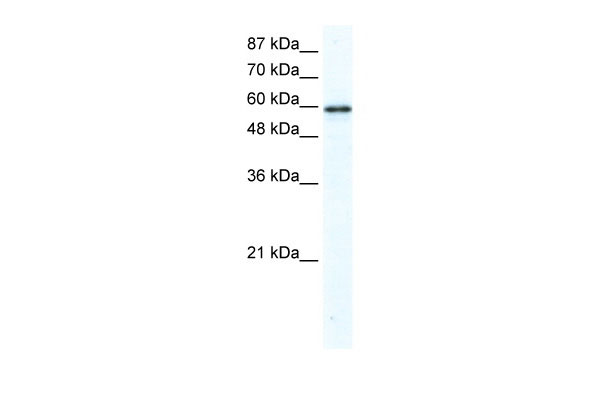G3BP antibody - N-terminal region
Rabbit Polyclonal Antibody
- 产品详情
- 实验流程
Application
| WB |
|---|---|
| Primary Accession | Q13283 |
| Other Accession | NM_005754, NP_005745 |
| Reactivity | Human, Mouse, Rat, Rabbit, Pig, Dog, Horse, Bovine |
| Predicted | Human, Dog, Horse, Bovine |
| Host | Rabbit |
| Clonality | Polyclonal |
| Calculated MW | 52164 Da |
| Gene ID | 10146 |
|---|---|
| Alias Symbol | G3BP, HDH-VIII |
| Other Names | Ras GTPase-activating protein-binding protein 1, G3BP-1, 3.6.4.12, 3.6.4.13, ATP-dependent DNA helicase VIII, hDH VIII, GAP SH3 domain-binding protein 1, G3BP1, G3BP |
| Format | Liquid. Purified antibody supplied in 1x PBS buffer with 0.09% (w/v) sodium azide and 2% sucrose. |
| Reconstitution & Storage | Add 100 ul of distilled water. Final anti-G3BP antibody concentration is 1 mg/ml in PBS buffer with 2% sucrose. For longer periods of storage, store at 20°C. Avoid repeat freeze-thaw cycles. |
| Precautions | G3BP antibody - N-terminal region is for research use only and not for use in diagnostic or therapeutic procedures. |
| Name | G3BP1 {ECO:0000303|PubMed:23279204, ECO:0000312|HGNC:HGNC:30292} |
|---|---|
| Function | Protein involved in various processes, such as stress granule formation and innate immunity (PubMed:12642610, PubMed:20180778, PubMed:23279204, PubMed:30510222, PubMed:30804210). Plays an essential role in stress granule formation (PubMed:12642610, PubMed:20180778, PubMed:23279204, PubMed:32302570, PubMed:32302571, PubMed:32302572, PubMed:34739333, PubMed:35977029, PubMed:36183834, PubMed:36279435, PubMed:36692217, PubMed:37379838). Stress granules are membraneless compartments that store mRNAs and proteins, such as stalled translation pre-initiation complexes, in response to stress (PubMed:12642610, PubMed:20180778, PubMed:23279204, PubMed:27022092, PubMed:32302570, PubMed:32302571, PubMed:32302572, PubMed:36279435, PubMed:37379838). Promotes formation of stress granules phase-separated membraneless compartment by undergoing liquid-liquid phase separation (LLPS) upon unfolded RNA-binding: functions as a molecular switch that triggers RNA-dependent LLPS in response to a rise in intracellular free RNA concentrations (PubMed:32302570, PubMed:32302571, PubMed:32302572, PubMed:34739333, PubMed:36279435, PubMed:36692217). Also acts as an ATP- and magnesium-dependent helicase: unwinds DNA/DNA, RNA/DNA, and RNA/RNA substrates with comparable efficiency (PubMed:9889278). Acts unidirectionally by moving in the 5' to 3' direction along the bound single-stranded DNA (PubMed:9889278). Unwinds preferentially partial DNA and RNA duplexes having a 17 bp annealed portion and either a hanging 3' tail or hanging tails at both 5'- and 3'-ends (PubMed:9889278). Plays an essential role in innate immunity by promoting CGAS and RIGI activity (PubMed:30510222, PubMed:30804210). Participates in the DNA-triggered cGAS/STING pathway by promoting the DNA binding and activation of CGAS (PubMed:30510222). Triggers the condensation of cGAS, a process probably linked to the formation of membrane-less organelles (PubMed:34779554). Also enhances RIGI-induced type I interferon production probably by helping RIGI at sensing pathogenic RNA (PubMed:30804210). May also act as a phosphorylation- dependent sequence-specific endoribonuclease in vitro: Cleaves exclusively between cytosine and adenine and cleaves MYC mRNA preferentially at the 3'-UTR (PubMed:11604510). |
| Cellular Location | Cytoplasm, cytosol. Perikaryon {ECO:0000250|UniProtKB:P97855}. Cytoplasm, Stress granule. Nucleus Note=Cytoplasmic in proliferating cells (PubMed:11604510). Cytosolic and partially nuclear in resting cells (PubMed:11604510). Recruited to stress granules in response to arsenite treatment (PubMed:12642610, PubMed:20180778). The unphosphorylated form is recruited to stress granules (PubMed:12642610). HRAS signaling contributes to this process by regulating G3BP dephosphorylation (PubMed:12642610) |
| Tissue Location | Ubiquitous.. |
Research Areas
For Research Use Only. Not For Use In Diagnostic Procedures.
Application Protocols
Provided below are standard protocols that you may find useful for product applications.
REFERENCES
Kociok,N., et al., (1999) J. Cell. Biochem. 74 (2), 194-201Reconstitution and Storage:For short term use, store at 2-8C up to 1 week. For long term storage, store at -20C in small aliquots to prevent freeze-thaw cycles.
终于等到您。ABCEPTA(百远生物)抗体产品。
点击下方“我要评价 ”按钮提交您的反馈信息,您的反馈和评价是我们最宝贵的财富之一,
我们将在1-3个工作日内处理您的反馈信息。
如有疑问,联系:0512-88856768 tech-china@abcepta.com.























 癌症的基本特征包括细胞增殖、血管生成、迁移、凋亡逃避机制和细胞永生等。找到癌症发生过程中这些通路的关键标记物和对应的抗体用于检测至关重要。
癌症的基本特征包括细胞增殖、血管生成、迁移、凋亡逃避机制和细胞永生等。找到癌症发生过程中这些通路的关键标记物和对应的抗体用于检测至关重要。 为您推荐一个泛素化位点预测神器——泛素化分析工具,可以为您的蛋白的泛素化位点作出预测和评分。
为您推荐一个泛素化位点预测神器——泛素化分析工具,可以为您的蛋白的泛素化位点作出预测和评分。 细胞自噬受体图形绘图工具为你的蛋白的细胞受体结合位点作出预测和评分,识别结合到自噬通路中的蛋白是非常重要的,便于让我们理解自噬在正常生理、病理过程中的作用,如发育、细胞分化、神经退化性疾病、压力条件下、感染和癌症。
细胞自噬受体图形绘图工具为你的蛋白的细胞受体结合位点作出预测和评分,识别结合到自噬通路中的蛋白是非常重要的,便于让我们理解自噬在正常生理、病理过程中的作用,如发育、细胞分化、神经退化性疾病、压力条件下、感染和癌症。






